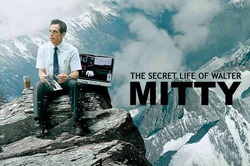 “To see the world, things dangerous to come to, to see behind walls, draw closer, to find each other, and to feel. That is the purpose of life.” (Life Magazine’s motto, as featured in The Secret Life of Walter Mitty) The Secret Life of Walter Mitty had a production budget of 90 million USD, and as such it is packed with special effects and breathtaking scenery filmed in remote locations. But the story goes beyond that. It explores the purpose of life (a subject too vast to be tackled here) and the power of imagination, which is the subject of this blog post. Walter Mitty had a clear vision of what his life would become when he was a rebellious teenager armed with a ‘Mohawk’ and a skateboard, but the life he imagined came to an abrupt end when he had to shave his Mohawk and become a responsible (read ‘boring’) citizen at the age of seventeen, following his father’s death. Twenty-five years later, he deals with the dreariness of daily existence by living out his fantasies inside his head on a regular basis, ‘zoning out’ from reality into his own dream world. One day, however, he is pushed into taking action towards making those two worlds converge – and so his adventure begins.
The movie is based on a short story of the same name, written by James Thurber in 1939. The original story is barely two pages long and it depicts a day in the life of an ordinary man who escapes the constant nagging of his wife by running away into his own fantasy world. Once there, he can be heroic, tough, brilliant or fearless; all the things he is not in real life. The story inspired two major movies. I haven’t seen the 1947 version, but apart from the main character’s name and the fact that he has an over-active imagination, the 2013 movie and Thurber’s short story have very little in common. The Secret Life of Walter Mitty (the film) certainly captured my imagination. It inspired me not so much to ‘live the dream’, as this is not always possible, but to appreciate the power and resourcefulness of the human mind and its capacity to 'dream the dream' in the first place. Although most of us don’t always have the means, resolution, opportunity, lunacy (or a combination of all of the above) that would enable us to pursue our wildest dreams, we all have the power to imagine them. We can all be superheroes in our own fantasies. We can also be anti-heroes, villains and rebels. We might not always picture ourselves as such, but it is often said that fantasy is essentially subversive: a rebellion against reality, reason, convention, rules and regulations, the darkness and dullness of everyday life. Even those who are not predisposed to daydreaming can still open the door to the worlds dreamed by others, by simply opening the pages of a book. I love fiction books because they take me to places that a car, a plane, or any amount of wealth couldn't take me to. They can transport me to other countries, to other eras, to entire other universes. Films can do this as well, but when watching a movie we are presented with the vision of that particular director, who has taken a script or a short story – as Ben Stiller did with Walter Mitty – and ‘imagined’ it for us, visualising it according to his individual world view. A book stimulates us to use our imagination to picture characters we have never met, places we have never been to, epochs we have never lived in, universes that don’t exist, artefacts that haven’t been invented yet. Writers conjure up entire worlds with their words, but it is up to the readers to bring those words to life in their minds. And thus we create worlds too, for no two readers will imagine the same book in the same way. Imagination is not exclusive to ‘lunatics, lovers and poets’, as Theseus claims in Shakespeare’s Midsummer Night’s Dream. Even Albert Einstein, who was a physicist, emphasised the importance of imagination in an interview published in The Saturday Evening Post (1929) in what became one of his most famous quotes: “I am enough of the artist to draw freely upon my imagination. Imagination is more important than knowledge. Knowledge is limited. Imagination encircles the world.” In some of my ‘secret’ lives I might be a ballerina, a gypsy, an amazon, a courtesan, a prophet, a butterfly. In all of them, I am a writer. Who - or what - are you, in the secret life of your imagination?
3 Comments
30/1/2014 07:24:43 am
Hi Bel
Reply
Leave a Reply. |
Midnight MusingsAuthorBel Vidal - Débutante novelist (author of Exuberance), blogger, Archives
December 2023
Categories
All
|

 RSS Feed
RSS Feed